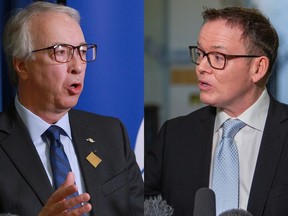Opinion: But the conservative wave could result in a new coalition of liberal and social democratic voters

Article content
The attempt to unite the B.C. Conservative Party and B.C. United has unsurprisingly failed.
The logistics of uniting the two parties this close to the election were too great, the ideological gaps were too wide, and there was too much bad blood between the principal actors.
Article content
I suspect the leaders knew that the challenges of uniting their parties were insurmountable, but they entertained the notion because they don’t want to be blamed after the election for dividing the vote and allowing the NDP to win.
Advertisement 2
Article content
There is a long history of liberals and conservatives co-operating in British Columbia to prevent the NDP, and its predecessor the Co-operative Commonwealth Federation, from winning.
In 1941, the B.C. Liberal party and the B.C. Conservative Party formed a coalition government to keep the CCF out of power. And for the next two elections, the Liberals and Conservatives ran a joint slate of candidates and defeated the CCF both times.
To make a long story short, when the coalition fractured in the early 1950s, W.A.C. Bennett formed a new centre-right party called Social Credit, which pulled together liberal and conservative voters. It governed continuously from 1952 to 1972.
In 1972, the NDP won its first government, when Social Credit and the Progressive Conservatives divided the vote. In the 1975 election, the NDP held its share of the vote, but liberal and conservative voters went running back to Social Credit, allowing them to win.
In 1991, the NDP won its second election, when the B.C. Liberals shot up in popularity and divided the vote with Social Credit.
When liberals and conservatives co-operate in B.C. politics, they focus on economic issues. In particular, they adopt pro-business policies to prevent the NDP from enacting “socialist” policies. And they put aside their social differences. Because social policy divides them.
Article content
Advertisement 3
Article content
So, this is the social contract for centre-right parties in B.C.: Focus on economic issues and avoid divisive social policies. That is how a liberal feminist like Christy Clark and a social conservative like Rich Coleman could work together as premier and deputy premier in the same government.
In the 2020 election, the B.C. Liberals under the leadership of Andrew Wilkinson were hurt by some of their more conservative candidates raising hot-button social issues. Indeed, the party substantially lost the liberal part of its coalition, particularly in the Lower Mainland.
When Kevin Falcon assumed the leadership of the B.C. Liberals in 2022, he understood that the challenge was to rebuild the liberal part of the coalition while retaining the conservative base in the Interior. While he needed to reconnect with more liberal-minded voters, he perversely changed the name of the party to B.C. United, which made it sound less liberal.
On the other hand, he didn’t do himself any favours when he ousted John Rustad from the party, and later bid good riddance to maverick MLA Bruce Banman. These men obviously made his job of connecting with more liberal voters more difficult, but together they have resurrected the moribund B.C. Conservative Party, just as a conservative wave is sweeping across the country.
Advertisement 4
Article content
And the new conservatism is driven primarily by social issues. Conservatives initially became mobilized against vaccine mandates during the pandemic, and now they are opposed to gender inclusive policies and efforts to combat climate change, among other things.
The B.C. Conservatives have clearly picked up support from voters concerned about the cost of living and housing, but a large section of the party’s base remains committed to fighting wokeism.
As such, there is no basis to unite the two right-centre parties. The old formula won’t work. They can’t focus on just economic issues, because one side wants to engage in social and cultural issues — issues that more liberal-minded voters generally support.
If history is our guide, this is a recipe for an NDP victory. Maybe this time will be different. Maybe the conservative wave will be so huge it will swamp the NDP and result in a government decidedly conservative on both economic and social issues.
Or maybe it will result in a new coalition of liberal and social democratic voters. A coalition that will be very difficult for conservatives to dislodge from power given the changing demographics of the province.
Hamish Telford is a political-science professor at the University of the Fraser Valley.
Article content



